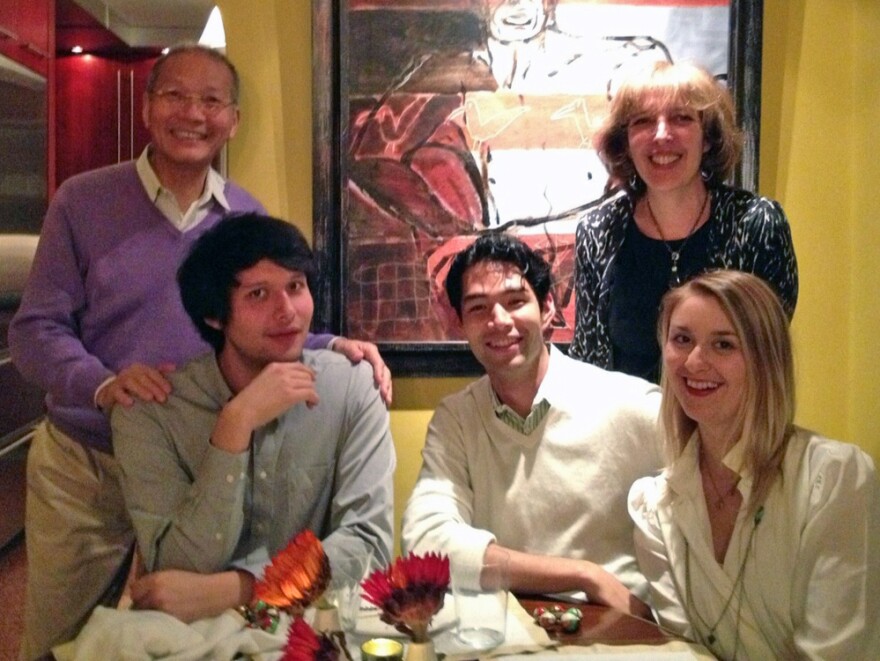NPR continues a series of conversations about The Race Card Project, where thousands of people have submitted their thoughts on race and cultural identity in six words. Every so often NPR Host/Special Correspondent Michele Norris will dip into those six-word stories to explore issues surrounding race and cultural identity for Morning Edition.
"Where are you from?"

"No, really, where are you from?"
Those questions about identity and appearance come up again and again in submissions to The Race Card Project. In some cases, Norris tells Morning Edition's Steve Inskeep, people say it feels accusatory — like, 'Do you really belong?'
It's also a question that Alex Sugiura, because of his racially ambiguous appearance, can't seem to escape.
Sugiura, 27, is the child of a first-generation Japanese immigrant father and a Jewish mother of Eastern European descent. Sugiura's brother Max looks more identifiably Asian, but when people meet Alex, they're often not satisfied to hear that he's from Brooklyn.
Some people find this question accusatory, as if the person being asked doesn't quite belong. But Sugiura actually welcomes the question and the conversations that flow out of it — and he says he understands why people ask.
"I have always thought I've had a particularly strange face," he explains. "I looked at my parents growing up and I didn't see their faces in my face — I did see some combination, some mixture." When he looked in the mirror, he says, he didn't see a "typical American face."
That may be so, but Sugiura's face, along with his brother Max and other adults and children of mixed race, was recently highlighted in the October issue of National Geographic. "The Changing Face of America" examines the nation's growing number of multiracial people and how they choose to identify themselves.
When Sugiura fills out question about race in the census form, he checks the box for Japanese. But in more casual situations, he self-identifies as American but says he's ethnically Jewish.

But for as long as Sugiura can remember, he's been confused with someone of Latin American descent. It first happened when he was 6 or 7 years old, when someone began asking him questions in Spanish. "And at that point, I had no faculty for the language and almost started crying cause I was just so terrified," he says.
But by age 11 he started to take Spanish classes. And while he'd already been taking Japanese language and cultural classes for years, he found he enjoyed Spanish much more.
"It was a passing fancy at first, this idea [that] by people jokingly or mistakenly identifying me as Hispanic. ... I thought there was some kind of safe space there, you might say — that I was given a kind of fictional persona," Sugiura says. "I would say it propelled me forward and I feel very much like my own man through the Spanish language."

There's another interesting wrinkle in Sugiura's thoughts on the intersection of race and appearance, Norris says, noting that this particularly sensitive subject was a bit tough for Sugiura to talk about. "He says that his height, his deep voice, his Type A personality, his sort of, big physical presence, has helped him sidestep ... some of the more painful, offensive stereotypes that are too often attached to Asian men."
Sugiura bristles at those stereotypes, and yet, he notes that his father "did us a great favor by marrying our mother. ... They made two tall, loud boys."
"When you're a typical, you know, shorter, soft-spoken Asian male, you are perceived almost to be weaker or lacking the fiber of what an American leader is supposed to be," he says.
Sugiura says this all goes back to the reason that he welcomes this question, "Where are you really from?" He sees that question as an opening to make the point that there are many different ways to be Asian, Jewish, white or even a New Yorker. "And he has a chance to make that point," Norris explains, "if he actually gets to participate in those conversations."
And, Sugiura notes, this question about where you come from can lead to some very unexpected conversations — like one his family experienced on a stop at a gas station in the American South. An older white man behind the counter asked his father, "Where are you from, boy?"
And while the question felt laden with tension, the outcome of the encounter surprised everyone. But the experience was a reminder, Sugiura says, of the unfortunate reality that one must assume the worst in this country when it comes to questions based on the color of one's skin.
Copyright 2022 NPR. To see more, visit https://www.npr.org.


